

Your eBook is reading you. 2010: E-Book Buyer's Guide to E-Book Privacy. With the 2010 holidays upon us, it's time to update EFF's E-Book Buyer's Guide to E-Book Privacy, which summarizes and comments on the privacy-related policies of several e-readers.
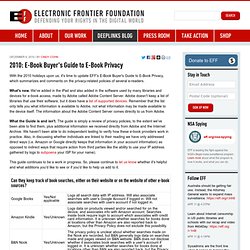
What's new. We've added in the iPad and also added in the software used by many libraries and devices for e-book access, made by Adobe called Adobe Content Server. Adobe doesn't keep a list of libraries that use their software, but it does have a list of supported devices. Remember that the list only tells you what information is available to Adobe, not what information may be made available to the device itself. The information about the Adobe Content Server comes directly to us from Adobe.
What the Guide is and isn't. This guide continues to be a work in progress. Your E-Book Is Reading You. Big e-reader is watching you. Big Brother, wrote George Orwell in Nineteen Eighty-Four, is watching you.
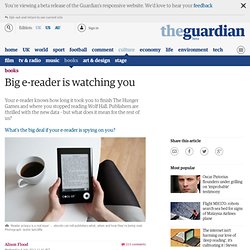
Would Orwell have been amused or disturbed by the development that Big Brother now knows exactly how long it takes readers to finish his novel, which parts they might have highlighted, and what they went on to pick up next? Because your ebook, as a recent article in the Wall Street Journal put it, is now reading you right back. Your e-reader knows how long it took you to finish A Game of Thrones, where you stopped reading Wolf Hall, how many pages of Fifty Shades of Grey you read an hour. It knows what you've highlighted or bookmarked: a passage from The Hunger Games trilogy, "Because sometimes things happen to people and they're not equipped to deal with them", is the most highlighted of all time on Amazon's Kindle, marked down by 17,784 users. Humphrey says Kobo is just starting conversations with publishers about sharing its data.
Award-winning author China Miéville feels similarly. Back to Orwell.
Student in al-Qaida raid paid £20,000 by police. Rizwaan Sabir has been paid £20,000 in damages by police.
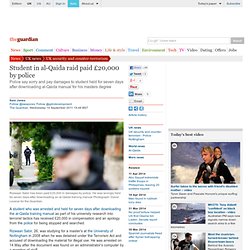
He was wrongly held for seven days after downloading an al-Qaida training manual Photograph: David Levene for the Guardian A student who was arrested and held for seven days after downloading the al-Qaida training manual as part of his university research into terrorist tactics has received £20,000 in compensation and an apology from the police for being stopped and searched. Rizwaan Sabir, 26, was studying for a master's at the University of Nottingham in 2008 when he was detained under the Terrorism Act and accused of downloading the material for illegal use.
He was arrested on 14 May after the document was found on an administrator's computer by a member of staff. Sabir had asked the administrator, Hisham Yezza, to print out the 140-page manual as they were collaborating on research. After seven days and six nights in custody, he was released without charge or apology. . • This article was amended on 16 September 2011. California Gets Reader Privacy Act: Still Not Enough.
California's Reader Privacy Act has been signed into law by Governor Jerry Brown.
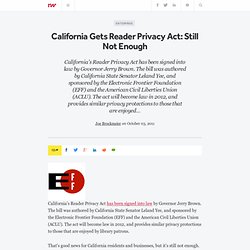
The bill was authored by California State Senator Leland Yee, and sponsored by the Electronic Frontier Foundation (EFF) and the American Civil Liberties Union (ACLU). The act will become law in 2012, and provides similar privacy protections to those that are enjoyed by library patrons. That's good news for California residents and businesses, but it's still not enough. The law, which will take effect on January 1, only applies to books and eBooks. It means that government or third parties won't be able to demand access to reading records, without proper justification and transparency about how the records are disclosed. The fact sheet from the EFF and ACLU (PDF) notes that government entities must obtain a court order and give the book seller or provider the opportunity to contest the request. Business Impact.
Readers' privacy is under threat in the digital age. Every time you read a newspaper on your computer or buy an ebook, you can leave an electronic trail behind you.
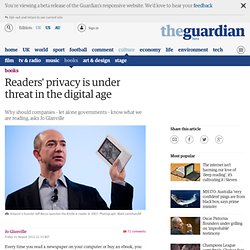
That trail is potentially lucrative for business, and is a new source of surveillance for government and law enforcement. Retailers and search engines, most notably Amazon and Google, can now gather an astonishingly detailed portrait of our book-reading habits: what we buy, what we browse, the amount of time we spend on a page and even the annotations we make in an ebook. As campaigners have quipped, it's the equivalent of a bookshop hiring someone to follow you round the shop noting every book you pick up, then sitting at home with you while you read what you bought. Defending the freedom to read is no longer only about battling against direct censorship in obscenity, blasphemy or libel cases. Since the digital revolution, it's now increasingly about protecting the freedom of the reader as much as the reading matter.